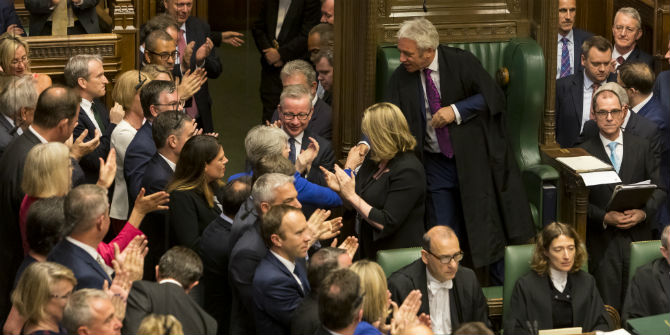 With less than 14 weeks remaining before the current Article 50 deadline, the Commons is not due to meet again for almost six weeks. This creates some very obvious scrutiny gaps. Meg Russell and Daniel Gover (UCL Constitution Unit) suggest that pressures for a Commons ‘recall’ during the summer recess seem likely, but that this will revive difficult questions about who can, and should be able to, recall MPs.
With less than 14 weeks remaining before the current Article 50 deadline, the Commons is not due to meet again for almost six weeks. This creates some very obvious scrutiny gaps. Meg Russell and Daniel Gover (UCL Constitution Unit) suggest that pressures for a Commons ‘recall’ during the summer recess seem likely, but that this will revive difficult questions about who can, and should be able to, recall MPs.
On 25 July, MPs left Westminster for the summer recess. Yet the new Prime Minister has only just arrived in No 10, making immediate parliamentary scrutiny of the new government’s key decisions all but impossible. An added pressure, of course, comes from the Brexit context. The current Article 50 deadline for the UK to depart the EU is 31 October, but parliament is due to remain closed for around half that time – for almost six weeks initially, until 3 September, followed by another break for the party conferences. During this period, calls for parliamentary scrutiny of the new government – most obviously over Brexit – seem very likely to grow.

In this post we examine the pressures that may build for a recall of parliament during the summer, and what mechanisms exist for MPs if they do. Crucially, a formal Commons recall can only be initiated by the government – which may push parliamentarians towards innovative solutions. In the longer term, pressures for reform of the recall process may well be revived.
Why there may be pressures for recall
Demands for the Commons to be recalled from a recess are not unusual, as discussed below. However, they seem especially probable this year. MPs broke up just one day after the new Prime Minister took office, while the tensions over Brexit and how Boris Johnson intends to handle it are running high.
There will be very little time under current plans for parliament to quiz the Prime Minister on his Brexit strategy. The immediate start to the recess hence already looks problematic, and claims that the new Prime Minister is dodging scrutiny may be made.
Given the pressing deadline, the new Prime Minister and his Brexit Secretary will quickly seek to enter negotiations with EU leaders and other governments. Public statements – through speeches or media appearances – are likely. But with MPs not sitting, the usual parliamentary mechanisms of accountability such as government statements to the House of Commons, or (particularly if these are not forthcoming) ‘urgent questions’, will not apply. This is in stark contrast to previous months, when ministers made frequent statements on Brexit. During sessions in both January and February, for example, Prime Minister Theresa May faced MPs at the despatch box for almost two and a half hours at a time.
A key question will be whether the new Prime Minister appears on track to negotiate a revised withdrawal agreement, or whether he appears set on pursuing a ‘no deal’ Brexit. The latter would be of particular concern to MPs. Given indications that various senior Conservatives might be prepared to vote down the government if it pursued such a strategy, there could even be suggestions that the Prime Minister has lost the Commons’ confidence – with no opportunity for that claim to be tested formally.
Calls for recall therefore appear quite likely, from the opposition, from concerned government backbenchers, from media critics, and possibly from the wider public. Questions seem inevitable about whether it is appropriate for the Commons to take an extended break at a time when the UK is potentially just three months away from a chaotic ‘no deal’ Brexit.
Why MPs may be frustrated
Recall of the Commons is however not easy to achieve, as the government effectively possesses a veto over such a move. The process for recalling the Commons when it is ‘adjourned’ (although not when it is ‘prorogued’ or ‘dissolved’) is set out in its Standing Order No. 13. This states that a recall can only be initiated by a government minister, with the Speaker empowered to grant the request if satisfied it would be in the public interest. The rules also state that the business to be discussed during recall is ‘such as the government may appoint’. Other MPs play no formal role. By contrast, the Lord Speaker is empowered to recall the House of Lords based only on ‘consultation’ with the government.
The government’s control over Commons recall has in the past led to loud complaints that ministers can be inappropriately shielded from parliamentary scrutiny and accountability. Most notably, during the escalation of tensions around Iraq in 2002–03, concerns were expressed about the inability to scrutinise Blair’s government when the Commons was not sitting, feeding calls for reform discussed below. More recently, David Cameron encountered complaints for having not recalled the Commons over the situations in Gaza and Israel and over Tata Steel in 2014, while Theresa May faced criticism last year for not recalling the Commons prior to military intervention in Syria.
What action could parliamentarians take?
Despite the formal limitations, MPs are not entirely powerless when it comes to creating pressure for a recall. As with so much at Westminster, the written rules tell only part of the story. Were demands for recall to grow, the main difficulties facing ministers would hence be political rather than procedural. Ultimately, it could prove counter-productive for government to resist serious demands to resume parliamentary business.
The first option available to MPs is to appeal to ministers, either through private or more public channels. This has often occurred in the past. For example, on the situation in Gaza and Israel cited above, Labour MP Debbie Abrahams presented a multi-faith petition to the Prime Minister in support of recall. Nonetheless, David Cameron rejected the suggestion as unnecessary. On Brexit (and indeed on the current tensions in the Gulf), pressures could more easily become overwhelming – particularly if supported by Conservative backbenchers.
An interesting question arises regarding whether peers could force a recall of the Lords, given the Lord Speaker’s greater discretion when compared to his Commons counterpart (which is traceable to the time when the Lords presiding officer was the Lord Chancellor – i.e. a government minister). Although the Prime Minister himself would not be present at a Lords recall, one of his ministers could at least be held to account in that forum. But this would very much be a second-best option, and in any case its likelihood is doubtful. The Lord Speaker would normally exercise discretion to recall the Lords only if the Commons itself had been recalled. However, if calls from peers became widespread, the pressure on him could be significant.
The more likely course of action if MPs’ demands for a recall are ignored is that they take matters into their own hands – and there is precedent for this approach. In 2002, when Blair’s government resisted calls for recall over Iraq, Labour backbencher Graham Allen drew up detailed plans to hold a ‘rebel, unofficial Parliament’ (as he explained in a Commons debate on 2 April 2009). The government having resisted pressure for recall, Allen consulted other MPs and, finding demand to be high, booked Church House in Westminster for the sitting to take place. He also gained agreement from a former Commons Speaker to preside over the debate, and from the BBC to live broadcast the proceedings. Recognising the risk of major embarrassment, the government relented and recalled the Commons for a formal sitting.
Repeating this strategy over Brexit is quite possible, and indeed similar proposals were recently made by the former Conservative leadership contender Rory Stewart in the context of a possible prorogation. Such an unofficial meeting would have clear limitations: it would not hold any formal power, and there is no guarantee that ministers would attend to respond to questioning. But a well-attended unofficial sitting could nonetheless have considerable political clout while, as in 2002, even the threat of such action could be enough to force the government’s hand.
Options for reforming the power of recall
Past controversies have fed calls for reform of the recall process, and various proposals have been made – including by a previous government (as set out this Commons Library briefing). Should tensions mount this summer, past proposals may well be revived in the longer term.
The simplest change would be for recall powers to be vested entirely in the Speaker, possibly with an inbuilt requirement to consult ministers first. Following the controversy over Iraq, Graham Allen pursued a cross-party motion to achieve this, and the Commons Procedure Committee subsequently made a similar recommendation in 2003. Such an arrangement would not be entirely new to Westminster: it already exists in the Lords, while (as set out in Erskine May) the Commons Speaker has had this responsibility in the past. Such a model also applies in other legislatures, including the Scottish Parliament, and the lower chambers of Australia and Canada.
This kind of arrangement would put considerable power in the hands of the Speaker. Hence an alternative would be for the Speaker to be empowered on the request of a certain number of MPs. In 2007, Gordon Brown’s government proposed this, with the necessary threshold being half of all MPs. However, the plan was never implemented. In 2017 the current Speaker, John Bercow, suggested that the threshold might be set at a quarter of all MPs, with an explicit requirement for cross-party support.
A third approach would be for a specific group of MPs to be empowered to trigger recall directly. In the past Conservative backbencher Peter Bone has argued for a new Business of the House Commission to be handed responsibility for recall. This is reminiscent of the proposal for a cross-party House Business Committee to schedule Commons business, as most notably made by the ‘Wright committee’ (the Select Committee on the Reform of the House of Commons) in 2009.
Whatever happens over recall this summer, other Brexit controversies – regarding prorogation and MPs’ taking control of the order paper – look set to fuel a wider debate about reform of the Commons’ control over its own time and agenda. When the dust finally settles, various such proposals are likely to be revisited.
This post represents the views of the authors and not those of the Brexit blog, nor LSE. It is an updated version of a post that first appeared at the UCL Constitution Unit blog.
ProfessorMeg Russell is Director of the Constitution Unit, and also a Senior Fellow at the UK in a Changing Europe studying ‘Brexit, Parliament and the Constitution’.
Dr Daniel Gover is currently a Research Fellow at the Constitution Unit, and is also a researcher at Queen Mary University of London.







“Whatever happens over recall this summer, other Brexit controversies – regarding prorogation and MPs’ taking control of the order paper – look set to fuel a wider debate about reform of the Commons’ control over its own time and agenda.”
Most important for democracy is the issue of whether Parliament should be able to reject the recommendations of the independent boundary commission as it did in 2013.